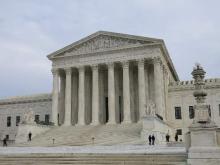Less than a week after hearing oral arguments, Supreme Court justices have ordered both sides to provide new briefs in a religious freedom case that centers on the federal government’s contraception mandate.
In an unexpected move, the justices on March 29 directed attorneys to file supplemental briefs that propose alternatives to the government’s current accommodation under the mandate. The high court wants to know whether, and how, contraceptive coverage could be obtained by employees of religious nonprofits through the plaintiffs’ health plans in a way that does not require employer involvement.
The request is likely an attempt to avoid a 4-4 ruling in Zubik v. Burwell, while finding a way to spare religious nonprofits from participating in the process of providing birth control coverage, according to analysts.
“The court here is clearly looking to craft a win-win situation; a compromise where no one has to lose,” said Mark Goldfeder, a law professor at Emory University in Atlanta and director of the school’s law and religion student program. “The court is asking for the parties to help craft a process by which the affected employees can get their contraception easily covered, in a way that does not violate their employer’s religious beliefs.”
During oral arguments on March 23, the justices focused much attention on the process of the accommodation and how the arrangement unfolds between employers and the government, said Laurie Sobel, a senior policy analyst for the Henry J. Kaiser Family Foundation who attended the oral arguments.
“The fundamental issue in this case comes down to how the accommodation works,” Ms. Sobel said in an interview. “The petitioners believe the notification is the permission slip that triggers the coverage from the insurance companies. The government’s position is, ‘No, that’s just a notification, and the requirement to provide the coverage comes from the law.’ That came up a lot during arguments.”
The Supreme Court’s more conservative justices, including Justice Samuel A. Alito Jr. and Chief Justice John G. Roberts, were skeptical that the accommodation is the least restrictive means of advancing a compelling interest. The court’s four more liberal justices – particularly the three women on the court – appeared to support the accommodation, said Marci A. Hamilton, a law professor at Yeshiva University, New York, who also attended oral arguments.
Ms. Hamilton wrote a friend-of-the-court brief on behalf of Rep. Bobby Scott (D-Va.) in support of the government.
“[Plaintiffs’ attorney] Paul Clement was very quickly attacked by all three female Supreme Court justices,” Ms. Hamilton said in an interview. “It was really interesting that the female justices clearly took this to heart. They fundamentally identified with the contraceptive issue, and they really dominated the first part of the argument.”
Justice Ruth Bader Ginsburg countered the assertion that under the accommodation, notification by employers is treated by the government as an authorization for contraceptive coverage.
“It’s not an authorization,” Justice Ginsburg said during arguments. “The government, the law, the regulation requires it, but it doesn’t matter whether you say, yes or no. And you could say, ‘I fill out the form. I do not authorize. I do not permit.’ It won’t make any difference.”
The ACA’s accommodation clause refers to an exception for organizations that oppose coverage for contraceptives but are not exempted entities, such as churches. The plaintiffs – part of seven consolidated cases that include a Catholic bishop and an order of nuns – argue that the opt-out process put in place by the government makes them complicit in offering contraception coverage indirectly. Forcing them to cooperate with the accommodation violates their rights under the federal Religious Freedom Restoration Act, according to the plaintiffs.
The government contends that the exception does not impose a burden on the groups and that courts should not disregard the interest of employees who may not share their employers’ religious beliefs. The 8th U.S. Circuit Court of Appeals struck down the exception twice, ruling that forcing organizations to offer contraceptive coverage – even indirectly – violates their religious rights. The 8th Circuit’s decisions are at odds with rulings by the 2nd and 5th Circuit courts.
Chief Justice Roberts indicated agreement that the government is attempting to take control of the plaintiff’s health plans and provide coverage against the will of the nonprofit employers, said Mr. Goldfeder.
During arguments, Justice Roberts also made it clear that religious liberty versus reproductive rights is not at the center of the case, noted Mr. Goldfeder, who co-wrote a friend-of-the-court brief for the American Center for Law and Justice in support of the employers. Specifically, Justice Roberts stressed that the case is rooted in the employer’s objection to the government’s mechanism, not to employees receiving contraceptive care.




